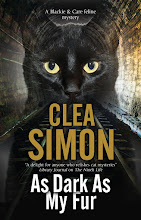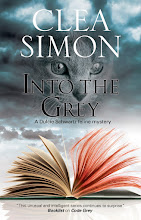Thank you for coming tonight.
As many of you know, I lost my mother on Sunday, so I’d actually like to start this reading by talking a little about her, before going onto my new book. There is a connection: My mother came to several of my readings here at Brookline Booksmith, and some of you probably met her here.
One of the last times she really went out into the world was to come to a reading here. That was for one of my mysteries, I don’t remember which. She already was having health problems and the logistics of that trip were difficult, but she was always incredibly supportive of my writing and she had wanted to be here, so I’m glad in retrsopect that we made it work.
What I remember most though, was when she came here to Brookline Booksmith for my first book, what might have been my very first reading. That book, as many of you know, was “Mad House,” about growing up with a brother and a sister who had schizophrenia – and the fact that my mother came at all was a real show of support on her part. I grew up, and she lived through, an era when mental illness was blamed completely on mothers. With two kids who were sick she was labelled a “schizophrenegenic mother,” and just took a lot of shit from social workers, psychiatrists, and others over the years. Even though those theories have since been discredited, the stigma lingered – and when I started working on “Mad House,” my mother definitely cringed. She expected more blame. Still, she managed to support my efforts throughout my research and writing. She even ended up revealing some family secrets that had stayed hidden until then. And when the book came out, she was at first unhappy – our relationship was complicated and I remember her saying, “Some people remember things differently” – but ultimately supportive. And she made plans to come to this reading.
This was a big step for her - coming out as the mother of two people with schizophrenia. But because it was her youngest daughter’s first book, she came – and several of her friends came too. And what happened was pretty amazing. I read, and her friends turned to her – and started to talk. These women had come to support her, and to celebrate her daughter’s first book. But what they began to talk about were their own lives. They talked about the mental illnesses in their own families. The spouses with substance abuse issues. The relatives who were never spoken of. The cousins who had “problems” and somehow disappeared. Nobody blamed my mother, instead, they all celebrated her strength and courage – and shared their own stories in a new, free spirit of intimacy. That evening here at Brookline Booksmith started a bonding and an outpouring of shared support for my mother, as well as for me. I’ll never forget it.
So with that in mind, I’d like to dedicate this evening’s reading to my mom, Iris Simon. But because I really don’t want to turn this into: My mother died, buy my book. I’d like to talk about what I’d originally planned to talk about tonight. I’d like to talk about motives for murder.
“Grey Matters,” like all my mysteries, is a book about cats and the people who love them – but it’s also a book about secrets. This book set, like its predecessor “Shades of Grey,” in and around Harvard, starts with a murder, and of course the identity of the murderer is a secret until the end. But I also wanted to make it a book that shows how all of us have secrets, though of course not all of us are murderers.
“Grey Matters,” like all my mysteries, is a traditional or cozy mystery. And one of the traits I love about this subgenre is that cozies are character driven. Even our crimes are supposed to emerge from the kind of real human emotions we all experience. Cozies don’t have crazed serial killers or dogma-driven fanatics as the villains. We write, more or less, about real people. And so when I’m setting up a crime, I need to be able to relate as much to the criminal as to the victims.
This can be a problem when you’re plotting a murder. Traditionally, characters are motivated to act through one of a series of prompts: rage, lust or greed, or envy. But we all experience these, and we’re not all murderers, right? So maybe it’s opportunity. But then again, motive and opportunity are not always enough either. When I started writing “Grey Matters,” I thought, for example, that I knew who the murderer was. I already had one character who has a terrible secret, the kind of secret that threatens to destroy everything that character has worked for – so I thought I had my murderer.
But one day, over brunch, I tried explaining my plot to Sophie, my 93-year-old mother in law - I guess there’s a mother theme tonight. And I kept trying to make the case for this one particular version of the crime. Sophie was great about it. She kept saying things like, “I understand. We are all capable of murder if driven hard enough.” Something which, if you know Sophie, you might doubt. But somewhere in the midst of all of this, I realized that I was trying too hard. The character I had in mind had motive and opportunity, but still, that character wasn’t the killer. It just didn’t feel right.
That’s when I realized I wanted to do my version of a classic mystery trope - a “Ten Little Indians” or “Murder on the Orient Express” style mystery in which many people have motives. Many people have secrets. This, after all, is true to life as I know it - maybe this does relate to “Mad House,” as well. And so in “Grey Matters,” I played it out. In this book, everyone has a secret. These secrets may seem minor, they may seem personal, but each one threatens something a character holds dear. Even my heroine, Dulcie Schwartz, has a secret: She hears the ghost of her late, great cat Mr. Grey talking to her, a secret that could seriously damage her academic credentials if it got out.
But which one would be the murderer? Working through these characters, I came up with a complex equation. Nothing scientific, or even mathematically accurate, but something like murder equals situational and underlying pressure plus basic character traits - plus a catalyst. In other words, you have to be the right person, under the right pressures – at the right time. It has to make emotional sense.
Does the result work? Does the mystery make sense? That, dear people, I leave up to you to decide. All I can tell you is that writing this book gave me a great opportunity to think about the human condition – and to work out what really could be a motive for murder.











